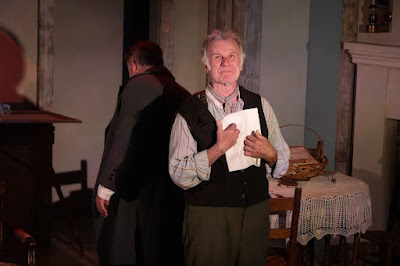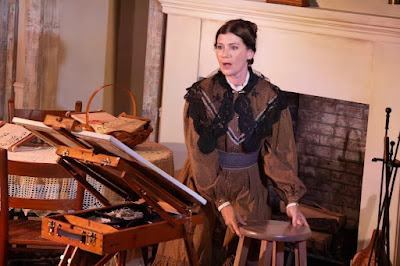Born in Colebrook, Connecticut on April 24, 1788, Ammi Phillips - the subject of Tammy Ryan's world premiere play "Seven Cousins for a Horse" at Thrown Stone - was an American itinerant portrait painter (active from the mid 1810s to the early 1860s in Connecticut, Massachusetts and New York) best known for his paintings of children, the most famous being "Girl in Red Dress with Cat and Dog," which sold for one million dollars (a first for folk art) and is currently on display at New York's American Folk Art Museum. It is one of four children's portraits featuring children dressed in vibrant red clothing with a dog on the floor that Phillips produced while living in Duchess County, New York in the mid-1830s.
"Ammi Phillips painted for six decades," explains Ryan. "About 900 paintings have been catalogued, though they think he may have painted over 2000.
"He was born when the Constitution was written, and he died just a few months after the Civil War ended. He saw enormous changes in the country and kept working through all of it.
"I knew I wanted to somehow capture something about what is was like to live through those changes, but frankly, I was overwhelmed."
Inspired by subsequent talks with art curators and scattered biographical details about Phillips himself, Ryan found the ideal subject matter and conceit for "Seven Cousins for a Horse."
In 1848, Nisus Kinney, a cousin of Phillips invited the artist to his home in Colebrook to paint realistic portraits of seven cousins in exchange for a very fine horse. That meeting and the days that followed are reimagined by Ryan in her thoughtful, engaging play involving the select Kinney populace including Hattie Kinney, the outspoken independent minded cousin engaged to marry Lucius Culver.
Each of the sessions finds one of the Kinney's seated before Phillips or alongside other family members engaging in backstory chatter and conversation, ranging from very personal stories about everyday 19th century life and spinsterhood to heated debates about the abolition of slavery and women's suffrage including the right to vote.
As playwright, Ryan is well-qualified to give an insider's view into the world of both the Kinney's and Phillips himself. They play is full of acute, personal and juicy ideas, observations, sentences and stand-alone quotes. It also never loses sight of the well-drawn characters, their ticks, their idiosyncrasies, their prejudices, their complaints and their beliefs in a better tomorrow.
Staging "Seven Cousins for a Horse," director Jonathan Winn uses Richard Harrison's visually pleasing, atmospheric period set as the play's main stomping ground (furniture and props are moved accordingly to show shifts in time and location), a place where time passes agreeably, enhanced by subtle movement, cynical overtones, arch references, historical fact and detailed maintenance that moves the action along without any form of hesitation.
Winn also is quite adept at keeping the narrative set in the time frame of the playwright's creation. The staging, the blocking, the interactions, the expressions, the couplings and the actual story evolution adapts a natural, but stylized patterning and positioning from another century that Winn and company pull off swimmingly. Scenes fulfill their intended purpose. Overlong speeches and monologues are not hurried or lost in translation. Characters are defined immediately following their introduction. Heated arguments and debates are enabled with full dramatic intention. The play's quieter moments are engaging, whimsical and enjoyably immersive. Incidental music composed by Aidan Meachem, who also appears in the production, adds warmth and shimmer to the proceedings.
"Seven Cousins for a Horse" stars Jason Peck as Nisus Kinney, Emmanuelle Nadeau as Sarah Kinney, Aidan Meachem as Lucius Culver, Emma Factor as Jane Kinney, Will Jeffries as Ammi Phillips, Bridget Ann White as Sally Kinney and Shannon Helene Barnes as Hattie Kinney.
The handsome cast, all well-chosen by Winn for the respective roles, bring plenty of emotion, angst, twist and atmospheric sting to Ryan's 19th century drama, which, in turn, heightens the play's footing, attitude, excitement, outrage, shock, irony and trickling revelation. Working together as a very confident, primed and able ensemble, they deep dive into play with a committed trust and swim that complements the story, its history, its presence, its moodiness and its evolution. They also bring an authentic, relaxed and natural life to the piece that honors the great and good of live theatre, its world premiere status, its thrills and spills and its immersive grasp and connection between actor and audience.
Technically, "Seven Cousins for a Horse" boasts a fine, astute design team whose impassioned, inspired and creative work heightens the visual appeal of the entire production. They are Richard Harrison (scenic design), Jason Peck (sound design), Jiahao (Neil) Qiu (lighting design), Aidan Meachem (score) and Brenda Phelps (costume design).
A remarkable new work that captivates, stirs and numbs the senses, "Seven Cousins for a Horse" cracks open a forgotten era and fills it with command, humor, debate and lived-in naturalism that ignites playwright Tammy Ryan's dialogue, the lives and fate of her characters, the detailed movement of the story and the play's flawed, but affecting conclusion.
The seven-member cast takes the audience through the play's dramatic moments, orchestrated with pride and deftness by director Jonathan Winn who gives his absolute all to the production, its newness and its definitive message about a group of people living in a time of great change.






No comments:
Post a Comment